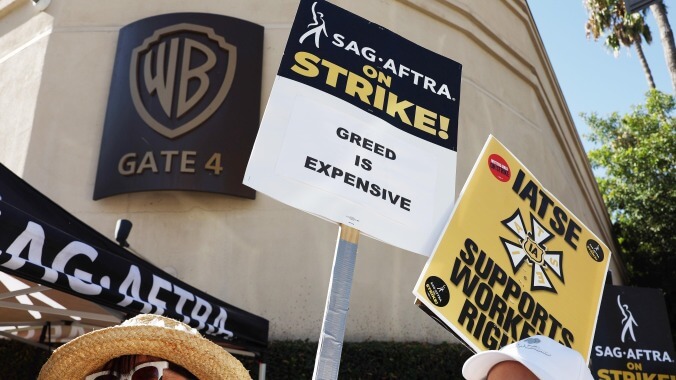SAG-AFTRA picket Photo: Mario Tama
After the Writers Guild of America secured a landmark deal with the Alliance of Motion Picture and Television Producers—which this week was ratified by 99% of that guild’s membership—there seemed to be hope that the concurrent SAG-AFTRA strike would soon reach a similar resolution. The AMPTP returned to the negotiating table with the actors guild on October 2 with the hope of preserving the film and television schedule in 2024. Unfortunately, 10 days later talks have broken down again, and it’s beginning to look dubious that Hollywood will be able to return before the new year.
In a statement to their membership, SAG-AFTRA’s negotiating committee reported their “profound disappointment” that the industry CEOs walked away from their latest counter. “We have negotiated with them in good faith, despite the fact that last week they presented an offer that was, shockingly, worth less than they proposed before the strike began,” they said. “These companies refuse to protect performers from being replaced by AI, they refuse to increase your wages to keep up with inflation, and they refuse to share a tiny portion of the immense revenue YOUR work generates for them. We have made big, meaningful counters on our end, including completely transforming our revenue share proposal, which would cost the companies less than 57¢ per subscriber each year. They have rejected our proposals and refused to counter.”
The AMPTP released its own statement claiming that “the gap between the AMPTP and SAG-AFTRA is too great” and said the guild rejected proposals related to common issues that the WGA and DGA ratified. (A full list of the AMPTP’s proposals can be read over at Deadline.) The statement specifically singled out SAG-AFTRA’s revenue sharing proposal, saying it “would create an untenable economic burden” and estimating the cost at “more than $800 million per year.”
Yet SAG-AFTRA asserts that the group “intentionally misrepresented to the press the cost” of that proposal, “overstating it by 60%.” According to the guild, “They have done the same with A.I., claiming to protect performer consent, but continuing to demand ‘consent’ on the first day of employment for use of a performer’s digital replica for an entire cinematic universe (or any franchise project).”
The negotiating committee condemned the AMPTP’s “bully tactics,” writing, “We feel the pain these companies have inflicted on our members, our strike captains, IATSE, Teamsters and Basic Crafts union members, and everyone in this industry. We have sacrificed too much to capitulate to their stonewalling and greed. We stand united and ready to negotiate today, tomorrow, and every day.”
According to a Deadline source, Wednesday’s discussion was “much rockier than usual” and highlighted revenue sharing and artificial intelligence as major sticking points in negotiations. With the holidays fast approaching—a time when Hollywood’s power players typically take a healthy amount of vacation—solidifying a deal in 2023 is becoming less and less likely. Even if the parties do come back to the table and make an agreement before the new year, television’s spring schedule is in serious jeopardy and summer movies are next on the chopping block. The power to bring back entertainment is excellent leverage for SAG-AFTRA, but the AMPTP’s decision to walk away at this critical juncture seems to indicate that the studio CEOs are willing to shoot themselves in the foot over these deal points. Long story short: strike summer has officially become strike autumn, with a possible long labor winter on the horizon.

